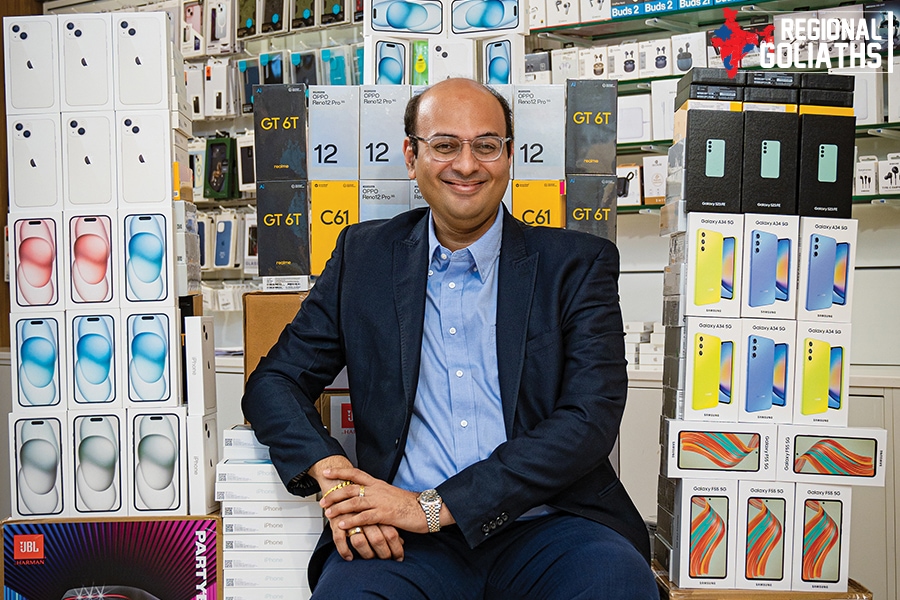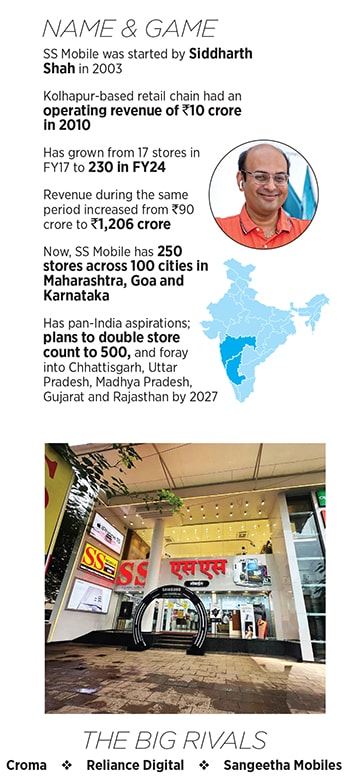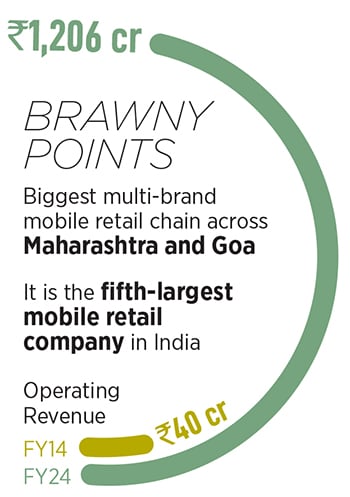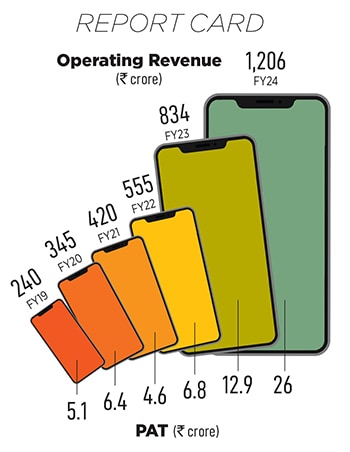From local brand to regional powerhouse: How SS Mobile spread its wings
In 2003, Siddharth Shah, a son of the soil from Kolhapur, spotted an opportunity in mobile retailing across the hinterlands of Maharashtra. Two decades later, SS Mobile has grown into India's fifth-largest mobile retail chain and the biggest in the state
 Siddharth Shah, Founder, SS Mobile
Image: Anirudha Karmarkar
Siddharth Shah, Founder, SS Mobile
Image: Anirudha Karmarkar
2006, Kolhapur. The fledgling dream of a young college boy was about to get snuffed. A little over three years into retailing phones in Kolhapur, Maharashtra, Siddharth Shah’s maiden venture posted heavy losses. Hailing from a family of doctors and super-achievers—not to mention his sister who was an international chess player—the rookie founder was under intense pressure on the personal and professional fronts. If the 22-year-old presumed that his love for math would have a positive rub-off on his entrepreneurial innings, he was sorely mistaken.
The embattled founder, though, stayed firm with his conviction. “But I have slashed the losses by half,” he pleaded, trying to make a strong case. The loss, he explained, was largely due to the vagaries of the mobile retailing business where the price of a few handsets crashed, and the absence of a well-oiled warranty and guarantee mechanism took a toll. “There is a bright future. I need another chance,” he pleaded passionately, persuaded his parents, and borrowed ₹6 lakh from them.
 Eight years later, in 2014, Shah was again in need of money, and another chance. This time, the business dynamics, though, had changed dramatically. SS Mobile was now a ₹50-crore revenue company, making money, and had survived a turbulent patch between 2012 and 2014 when recurring retail thefts, high employee attrition and a glaring absence of tech infrastructure rocked the venture. By 2015, Shah had fixed operational irritants, opened 10 stores, and expanded the multi-brand mobile retailing company outside Kolhapur into the neighbouring areas of Konkan, Sangli, and Satara. Now, Shah wanted to step up the pace of expansion and needed capital to fuel his aggressive rollout—he reached out to his parents again for money.
Eight years later, in 2014, Shah was again in need of money, and another chance. This time, the business dynamics, though, had changed dramatically. SS Mobile was now a ₹50-crore revenue company, making money, and had survived a turbulent patch between 2012 and 2014 when recurring retail thefts, high employee attrition and a glaring absence of tech infrastructure rocked the venture. By 2015, Shah had fixed operational irritants, opened 10 stores, and expanded the multi-brand mobile retailing company outside Kolhapur into the neighbouring areas of Konkan, Sangli, and Satara. Now, Shah wanted to step up the pace of expansion and needed capital to fuel his aggressive rollout—he reached out to his parents again for money. Shah had a plan. But it had an inherent glitch. To raise money, he wanted to mortgage his parents’ house. The family was apprehensive and tried to temper the excitement and aggression of the entrepreneur who had tasted success. The deadlock persisted for over six months and finally the family yielded. In 2016, Shah raised ₹25 crore from a bank, and a local businessman, Narendra Firodi. The electronics retail chain—which was so far confined to Tier II, III and IV towns across south Maharashtra—was ready to make a transition from being a local brand to a regional powerhouse.
Over the next three years, SS Mobile grew at a brisk pace. Store count galloped from 17 in FY17 to 50 in FY19, revenues leapfrogged from ₹90 crore to ₹240 crore, and PAT (profit after tax) increased from ₹2.8 crore to ₹5.1 crore during the same period. Over the next fiscal, the pace gathered momentum and SS Mobile clocked its best numbers: ₹345 crore in revenue, 70 outlets, and ₹6.38 crore PAT in FY20. Shah was making the most of the smartphone boom, which started peaking from 2015 onwards. Five years later, by early 2020, India shipped 158 million handsets and overtook America to become the second-biggest smartphone market in the world.
For Shah too, the business burgeoned, and he was all set to make bolder bets. But then Covid came calling. Brick-and-mortar stores bore the brunt of the pandemic, SS Mobile’s furious pace of expansion came to a screeching halt, and businesses built on offline retail models stared at an uncertain future. The existential crisis triggered a radical business rejig and forced Shah to cook a ‘ROTI’ plan for survival.
 The ‘ROTI’ package was simple. Shah introduced a variable component in salary compensation, linked it with performance, and incorporated ‘ROTI’ in the annual compensation of his employees. ROTI (return on time invested) was dangled as a bait to earn more and was billed as a sure-shot way to rise quickly in the corporate hierarchy. As expected, the disruptive idea faced stiff resistance from employees who were used to a fixed salary regime and a liberal accountability culture. Shah tried to create a healthy rivalry among the staff by pitting one against the other. “Woh toh kama raha hai, tu kyon nahin kama raha (he is earning but why are you not making money)?” he tried to create a sense of FOMO (fear of missing out) among the workers who were also adjusting to an online culture of sales.
The ‘ROTI’ package was simple. Shah introduced a variable component in salary compensation, linked it with performance, and incorporated ‘ROTI’ in the annual compensation of his employees. ROTI (return on time invested) was dangled as a bait to earn more and was billed as a sure-shot way to rise quickly in the corporate hierarchy. As expected, the disruptive idea faced stiff resistance from employees who were used to a fixed salary regime and a liberal accountability culture. Shah tried to create a healthy rivalry among the staff by pitting one against the other. “Woh toh kama raha hai, tu kyon nahin kama raha (he is earning but why are you not making money)?” he tried to create a sense of FOMO (fear of missing out) among the workers who were also adjusting to an online culture of sales.The gambit worked. ROTI, kapda and mobile became a war cry, the pandemic headwinds turned into tailwinds as the world shifted to mobiles and laptops, and SS Mobile closed FY21 at a new high: It touched the 100-store mark, and increased revenue to ₹420 crore. Now, the next big challenge for Shah was to remove the stigma of being a rural brand confined to the hinterlands of Maharashtra. For over a decade-and-a-half, SS Mobile built its empire across north and south Maharashtra, Marathwada, and Vidarbha. Now it was time to enter the top cities, and it decided to open its account with Pune.
The Queen of the Deccan, though, turned out to be a litmus test for the son of the soil. Pune triggered a cultural shock. SS Mobile’s business model, which was geared to grow in the rural and urban markets, came under acute stress on multiple fronts. Shah explains. First, the rentals skyrocketed. “I was paying ₹3.5 lakh in Pune. It was crazy,” he recalls. When contrasted with what Shah was shelling out in rural areas, the math didn’t make sense. Second, the salaries suddenly looked gigantic when juxtaposed with what the country folks were earning. Third, the employee attrition rate soared. One of the top cities of Maharashtra was fast turning out to be a capital punishment for Shah.
Also read: We didn't build Naturals to sell it. IPO also not on our minds: Siddhant Kamath
The founder stayed put and customised the business model. He rolled out an innovative plan—‘main bhi banunga partner’ (I will also become a partner). Shah was trying to kill two birds—attrition and talent—with one stone. The crux of the strategy was to lure young professionals with a compensation structure that had a fixed salary component and a profit-sharing arrangement if the store grew at a brisk pace. The catch was that the offer was only for employees who had completed a year.
 The trick worked. By June 2024, Pune had 39 stores, and Mumbai had 10. Cities, interestingly, added to the heft of the mobile retailing brand which closed FY24 with a revenue of ₹1,206 crore, and a store count of 230. Over the next four months, SS Mobile expanded its play with 250 stores across 100 cities in Maharashtra, Goa and Karnataka. Now, Shah is nursing pan-India aspirations, plans to double the store count to 500, and foray into Chhattisgarh, Uttar Pradesh, Madhya Pradesh, Gujarat and Rajasthan by 2027.
The trick worked. By June 2024, Pune had 39 stores, and Mumbai had 10. Cities, interestingly, added to the heft of the mobile retailing brand which closed FY24 with a revenue of ₹1,206 crore, and a store count of 230. Over the next four months, SS Mobile expanded its play with 250 stores across 100 cities in Maharashtra, Goa and Karnataka. Now, Shah is nursing pan-India aspirations, plans to double the store count to 500, and foray into Chhattisgarh, Uttar Pradesh, Madhya Pradesh, Gujarat and Rajasthan by 2027.Marketing and branding experts are not surprised by the audacious pitch of the founder from Kolhapur. The reason? SS Mobile’s business model and foundation are built on two strong pillars. First, it is not a typical electronics retail chain like Croma, Reliance Digital and Poorvika that deal with a bunch of electronics products such as washing machines, air-conditioners, refrigerators and kitchen appliances. SS Mobile retails only handsets, television sets, and accessories such as smartwatches. The average store size is 500 square feet, which means lower operational expenses, low overhead costs, and almost negligible warehouse bills.
Second, the multi-brand retail chain has sharply focussed on mobiles, a high-repeat item which results in high volumes and sales. “It has played a focussed game and not tried to spread itself thin by entering multiple categories,” says Ashita Aggarwal, professor (marketing) at SP Jain Institute of Management and Research. Though it has grown from a local to a regional player, and now aspires for a pan-India tag, it has stayed away from taking on the Cromas and Reliance Digitals of the world.

What has also helped SS Mobile is its hinterland approach. The formative years were spent establishing the business model in areas where the operational cost is not as prohibitive as the top cities. “Staying away from cities helped during the first decade,” underlines Aggarwal, adding that the big challenge for the brand would be to temper its hyper-aggressive plans. “The brand could make it big because of staying lean, mean and focussed,” she says, adding a word of caution. It took two decades for the brand to transition from being a local to a regional heavyweight. The next milestone—a national player—should not be done in a hurry. “Slow and steady is the mantra,” she says.
Shah, for his part, sounds confident. Though mobiles will remain the core of the business, he has been adding a few related verticals such as mobile insurance, and pre-owned or used phones. “I want to make SS Mobile a ₹10,000-crore company by 2027, and go for an IPO in 18 months,” he says. The critics might bill it as an extravagant dream, but who would have thought that a lad from Kolhapur would end up creating the biggest mobile retailing brand in Maharashtra, and the fifth-biggest chain in India? Shah wants to make the most of his dream run. “If you dream, you better dream big,” he signs off.
(This story appears in the 09 August, 2024 issue of Forbes India. To visit our Archives, click here.)


















